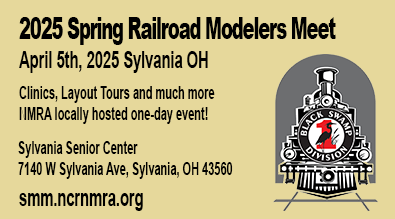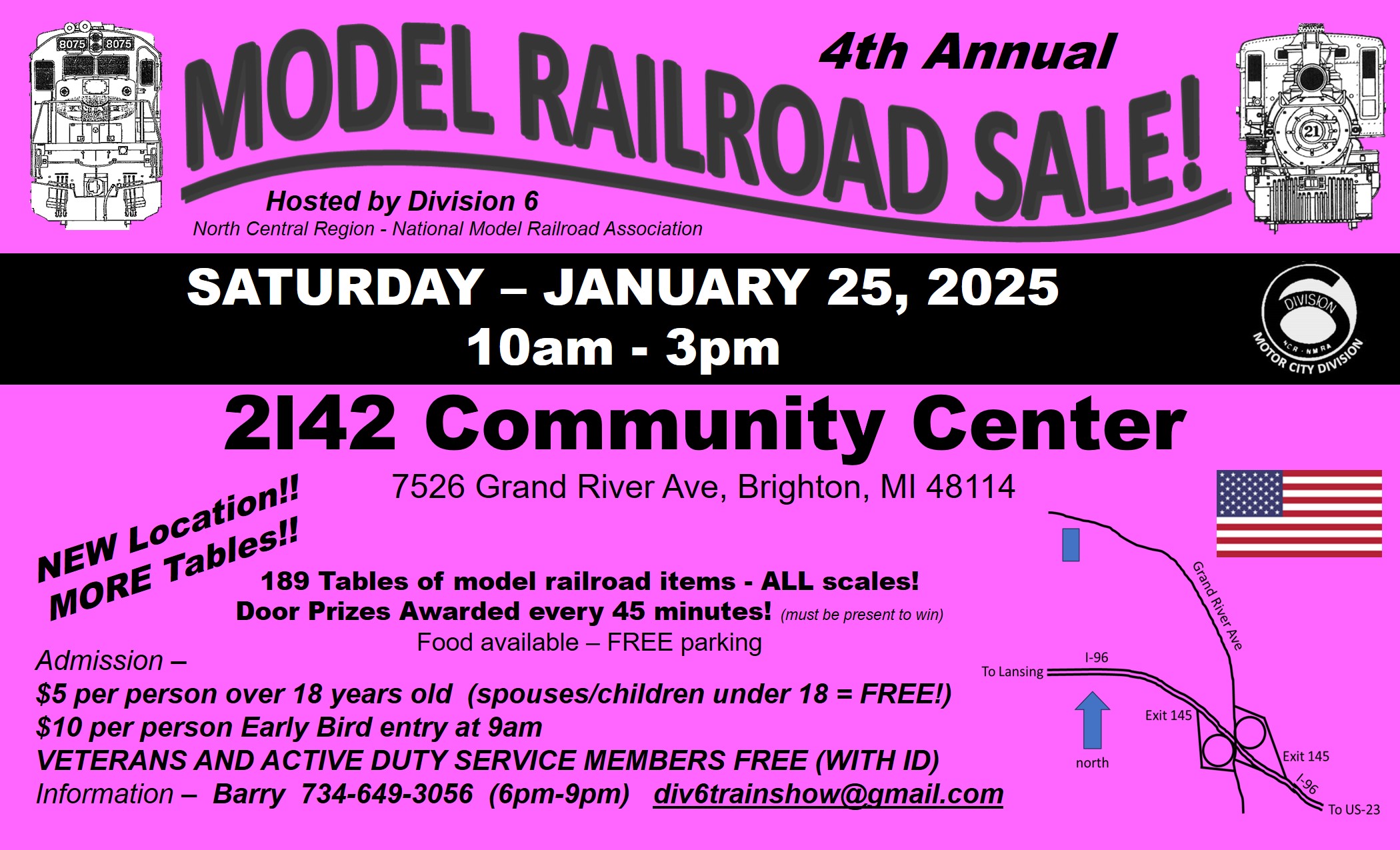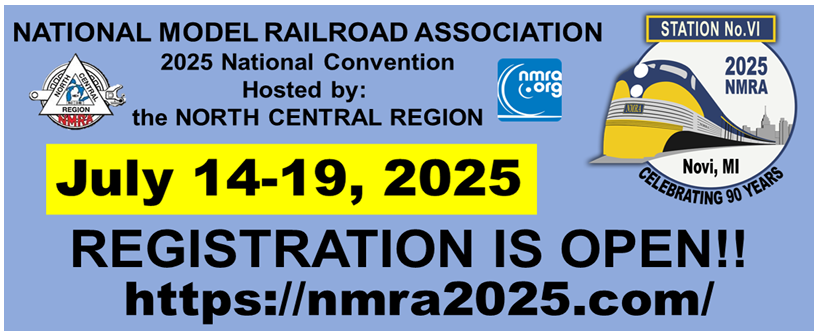NCR Black Swamp Division (Div 1) Officers
Superintendent - Marshall Stull Assistant Superintendent - Brian Burr Chief Clerk - Ray Huber Treasurer - Randy Bosscher Trainmaster for Services - Steve Glass Director At Large - David McMullian Director At Large - Tony Kukwa
Appointments and Helpers
AP Program - Ron Gilbert Editor/Webmaster - Marshall Stull AV/Computer Support - Steve Glass AV/Computer Support - Steve Richwine New Member Outreach - Open
We Need Help!
We need stuff for the Train Order! Please submit any article/photo/information to the editor. any kind of information is great, please tell us what you are up to!! Even if it's just a photo of your layout, something you saw, or what's on your worktable we would love to see it.
Sharing is the best way to spread the hobby and ideas.
Our mission is to promote education and fellowship through the sharing of information and the promotion of the world's greatest hobby. - Model Railroading.
From the Editor

Welcome to 2025! Another trip around sun and here we are. As always News Years Resolutions are far and wide, just waiting to be broken! My resolutions are very simple; Enjoy the hobby and Have Fun!
If you missed the Holiday Party, you missed a very good time! In this issue we have a quick recap of what items people brought to share. both in food and a few show and tell items. This month's train order also includes a new Observations article on the insight to the workings of railroad pools, extra boards, yard jobs and more. So get your favorite warming beverage, relax and enjoy this New Year's Issue of Train Order.
WANTED! - Photos and Articles for the Train Order!! New content is always needed, and new thoughts and ideas are the best. Even new twists on old ideas are great. Maybe you have a certain technique for ballast or car maintenance or a locomotive you just upgraded. Send a photo and a small paragraph. It does not need to be professional, just jot it down in an email and fire away. Any content is welcome. Email any content or ideas to the editor at blackswampdiv@div1.ncrnmra.org.
View from the Cab

Happy New Year! We are looking forward to another fun year of Model Railroading. BIG CHANGE THIS YEAR - Our meetings are on the SECOND FRIDAY of each month. As a result our next meeting is Friday January 10th! This seems so early now that we are here! This will take some getting used to!
Modeling Challenge! - The kits are out there! Have you started? How far have you progressed? I want to invite everyone to bring updates to the January Meeting for Show and Tell. Share issues, corrections or surprises with the group. Need help, maybe others have had the same issue. Our February 14th meeting is where we will each show what we did with the kit. The January 10th meeting is the last meeting to get help if you need it. As a reminder, you do NOT have to build it as intended. You can bash this anyway you see fit. We are looking forward to seeing what everyone does. THIS IS NOT A CONTEST!! This is for fun, to learn, and push our skills.
Saturday Open House - We will not have an open house for January. We will have an open house in February!
Elections
2025 is an election year for us. All positions are up for election. If you would like to volunteer/run for one of these offices, please let me or any board member know. A list of the positions and the basic responsibilities of each is listed below. All terms are for 2 years.
Superintendent
- In charge of Division One and presides at all meetings of Division One and the Division One Board of Officers
- Represent the division and serve as a director on the North Central Region's Board of Officers
- Appoints Chair of Special Committees as required
- Preside at meetings when the Superintendent is absent
- Will assume the duties of the superintendent should the office of superintendent become vacant
- Arranges for programs at regular meetings such as: clinics, layout tours, and prototype tours
- Keep the minutes of all Division One meetings and the Board of Officers meetings.
- Arrange for the preparation and distribution of ballots as required (election years only)
- Present the budget to the membership at the first regular meeting of the fiscal year
- Has custody of the financial reports and all moneys, funds and property of Division One
- Receive all moneys
- Disperse funds as directed by the Board of Officers/budget
- Responsible for the "house set up" and arranging for refreshments for meetings and outings.
- Responsible for other meeting related duties as delegated by the superintendent/board.
- Member of the Board of Officers
- Adds to oversite and direction
I look forward to seeing everyone at the meeting!
Marshall Stull,
mstull@marshallstull.com
Superintendent
Clinic Corner
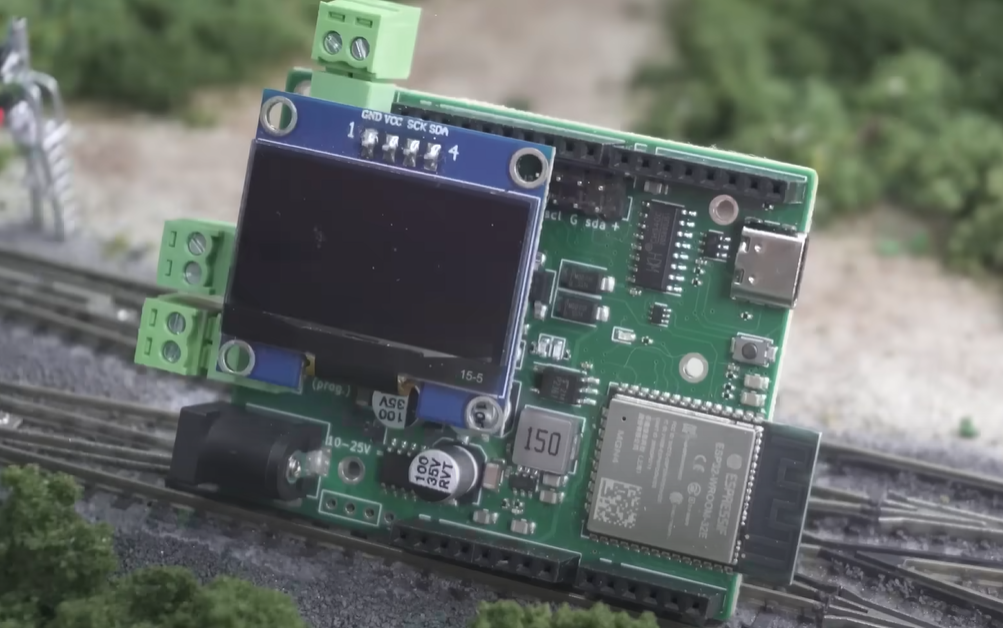
The clinic for January will be on DCC innovations in Command and Control, presented by Marshall Stull. This will be a presentation and open discission on some of the new technologies that have come to light recently. Members are welcome to bring in new or innovative methods of using DCC command systems and join the conversation. Note: the emphasis on this clinic will be command and control systems. Our March clinic topic will be on DCC in the locomotives and rolling stock with emphasis on decoders.
See you there,
Brian Burr,
Assistant Superintendent
January 10th Meeting Agenda
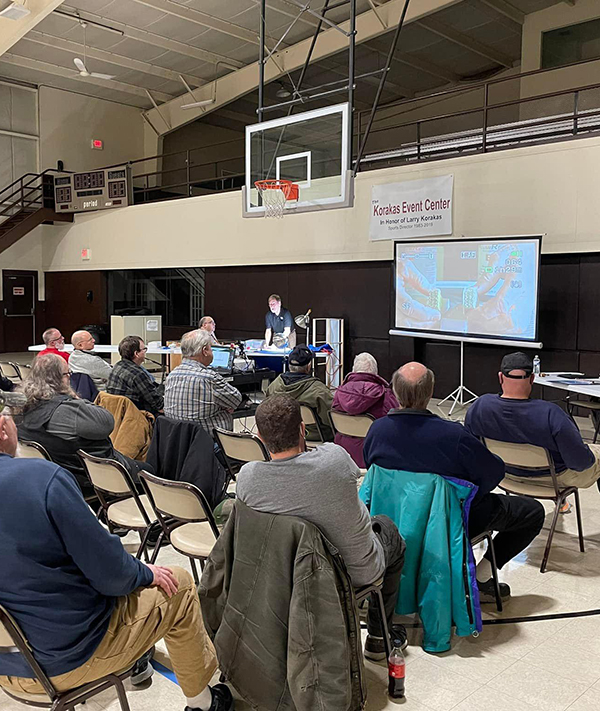 Here is a quick breakdown of what to expect at the meeting:
Here is a quick breakdown of what to expect at the meeting:- Rip Track Table - Have items you want to sell or just give away? Put them on the table
- Business
- Q&A - Ask our members about anything
- Show and Tell - whatever you want to share
- Break
- Door Prizes
- Clinic - DCC Innovations in Command and Control
- Closing Remarks - Announcements and Open Discussion Points
The lighter side of the hobby
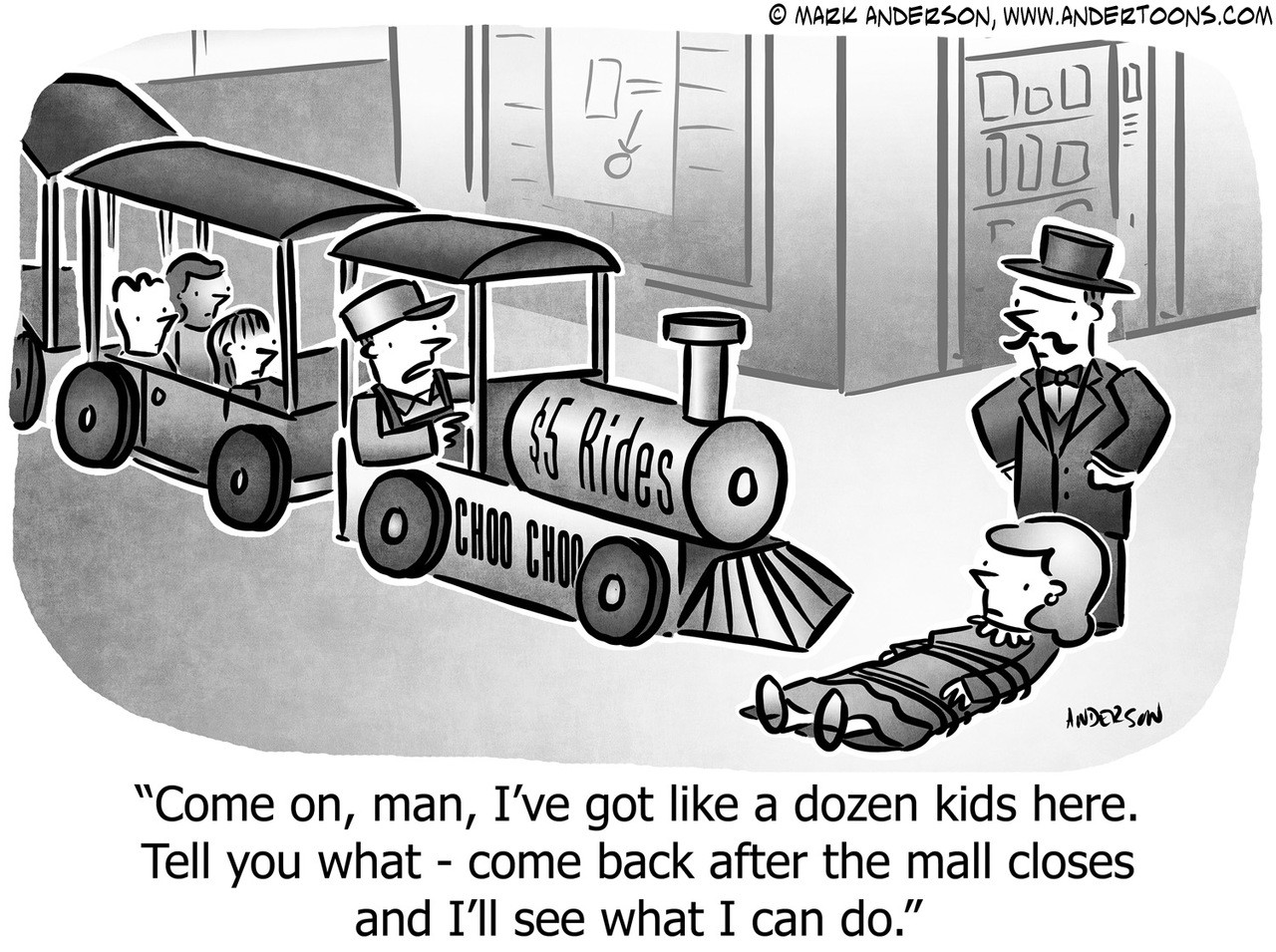
December Party Highlights
The following items were brought for Show and Tell in December;
Steve Kapela brought in a foundry diorama he had completed. Steve explained how the diorama will be placed on his layout in the near future.

Dave McMullian brought footage of the first run of his Boston & Maine, Yankee Flyer passenger train. Dave says, it still needs some interior finishing, add window glazing, and lights.
Steve Glass brought a unique toy train accessory from the 40's or 50's. It is an Audio-Engineer made to control a Lionel train with voice activation. The name of the company that designed it (Electro-Nuclear Devices, Inc) raised a few questions!!
Tony Kukwa showed us a trailer flat he made from cheap parts from various sources showing a presentable model can be made from simple parts. tony also brought a B&O RDC equipped with DCC.
In case you missed it, here is a quick look at the the goodie table!
OBSERVATIONS - by Larry Hickman
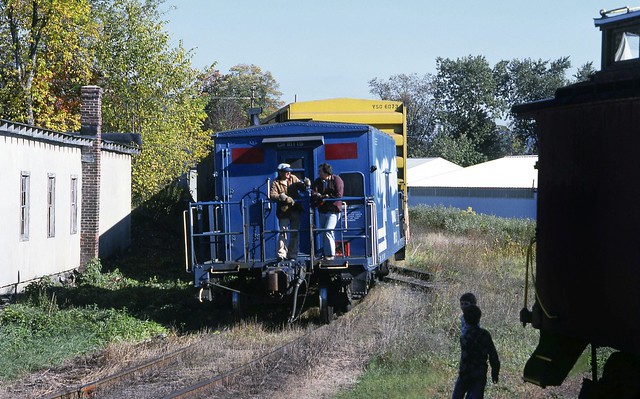
As the years passed I worked and talked with many older employees about the earlier times on the railroad. They described various incidents and wrecks as well as the employees involved including stories about the good times and the bad. Many employees were old timers with years of seniority and worked the same jobs with the same crew members year after year. Many crew members took their vacations at the same time. In the warm months you would find them working outpost and yard jobs as they enjoyed being home each day. When the cold weather arrived they moved from these jobs to road or pool jobs allowing them to stay out of the cold as much as possible. Your only chance of working with these guys was off the extra board, which in some cases was very seldom. Some of these older employees grew up during the depression of the 1930's and didn't mark off work, unless necessary, which for an extra board employee was very seldom. Many conductors were cantankerous or just plain hateful. I don't think they like themselves or anyone else. Working for some these guys no matter what you did was never good enough. I knew one conductor going through extra board men like you spit seeds from a watermelon. Conductors, when I hired out, were like Gods and could make or break a job and drive trainmasters crazy. Some engineers were just as bad and called for a job having these two types of employees made for a long, long day. If they liked you, no problem, but if they didn't Lord help you. I had engineers trying to bounce you around in the caboose like a rubber balI and conductors doing things to get at the engine crews. I worked with a few trainmen who hadn't washed their bib overhauls in days and sometimes I thought weeks. I always believe when they took them off, they could stand up by themselves and would dive into boiling water just to get clean. We had one on Conrail that stunk and when he came into the shanty everyone went outside and sat on the benches. When he left the shanty everyone on the break went back inside He was reported to the trainmaster, but there wasn't anything they could do. Showing up to sign his retirement papers was something to see. He arrived in the Love Mobile, which was an old beat up rusted, duck taped blue Cadillac, with no muffler driving his top speed of 15mph. He walked into the Hump Shanty wearing brand new clothes, jacket and shoes to say his goodbyes and soon departed for the office to sign his retirement papers. I never saw him again after that day. He was a good worker and lived at home taking care of his aging mother, when he wasn't working, but I believe he was very lonely man. Over the years I knew many of these employees. I worked with a conductor on his last trip to and from Detroit. When we returned home everyone wished him good luck on his retirement. Arriving at work the next day found him looking at the call board. This board showed all the various jobs, with the names of each employee written on a wooden plug slid into various slots as well as those on the extra boards, off sick, with permission, vacation etc. As crew members showed up, we asked him why he was there. He replied, "Just came out to look at the board." He was one of those employees who had no hobbies, but work. Two weeks later he passed. Every department has known employees such as these. I know many will read this and say this didn't happen, but sadly it did. There were many stories told over the years including those about me. I have to look back and laugh at times and when I do, thank God I wasn't killed or paralyzed from an accident.
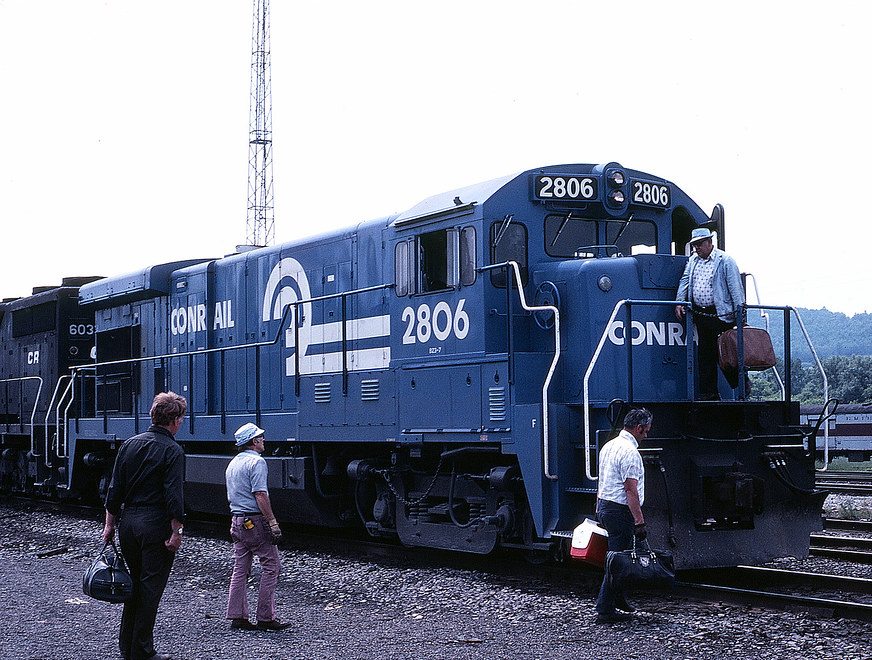
For those of you interested. Railroads assign trains into various pools. Some trains only run a hundred miles or less and are in short pools, while others may run over two hundred or more miles and are in long pools. You can pick which pool you would like to be in according to your seniority. Long pools go from terminal to terminal and will usually be the hot trains having no work. Short pools handle the mundane work of picking up and setting out cars at various yards or outpost locations during their run. Locals are trains operating from one location to another such as the Woodville Local, which originated at Woodville Yard and turned at Tiffin and later terminating back in Woodville Yard after switching industries to and from Woodville. An outpost job was an industrial switching job, where there were one or more large industries requiring an assigned job for handling switching. In some cases industries may have their own engines, but this is a rarity. A yard job was assign to a specific yard and handle switching duties within this location.
An extra board is used to fill vacancies on various jobs and when I hired out there were two, with these being Yard Extra Board and the Road Extra Board. These were further broken down into yard conductor and brakeman boards. This was also true for the road board having both road conductor and trainman's board. In later years these were combined into one board handling both the conductor and trainman vacancies. In order to work a conductor job or vacancy required you to have the knowledge about many rules and regulations as well as being qualified on the characteristic of the railroad, such as yards, industrial locations, towns, sidings, signals, etc. According to the Rule Book the conductor is responsible for the movement of the train and those employees working under him. In the early years attending a Book of Rules Class was handled by a Rules Examiner and was a verbal, but in later years this changed. Each employee had to take a written test on the characteristics, rules, regulations, hazardous materials etc. once a year. Employees must operate over various portions of railroad at least once a year to keep up their qualifications; otherwise you re-qualify on your own time. In some cases this could be five hundred miles or more.
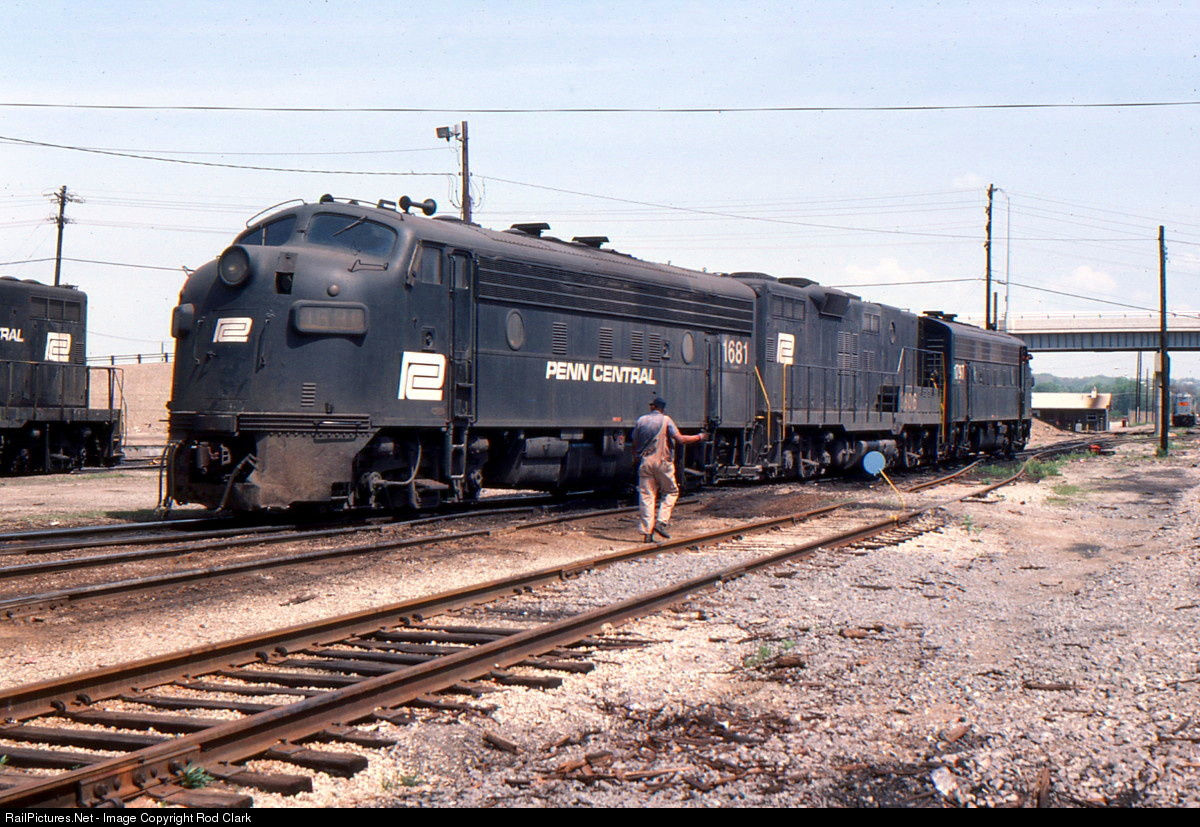
Each yard job had a symbol and a start time and a quit time, which was usually eight hours, anything over eight hours was overtime. Outpost jobs could be anywhere between eight hours to sixteen hours and were usually your locals and industrial jobs at outlying points, while road or pool jobs could be as long as five or six hours to sixteen hours. This depended how long it would take to get from terminal to terminal and the work involved. Some pool jobs didn't have any work and from the time the crew went to work and terminated from five or six hours to up to sixteen and now twelve. Yard jobs and outpost jobs were paid by the hour with one to eight hours being considered a yard day and anything over eight hours was considered overtime. Road or pool trains were paid by the miles. The more miles run the more the pay and anything under a hundred miles was paid a road day or eight hours, while anything over these miles had to be run off before going on overtime. Our union gave us a book indicating the total miles to be run before going on overtime. Each job had its benefits, but the money was on the road jobs. The downside you spent anywhere from eight to thirty or more hours waiting on the next train returning to your home terminal. Before I hired out you may be two or more days before returning to your home terminal. Many Toledo crews were called for extra jobs at their away from home terminal according to the older employees. Engineers were paid by weight on drivers. The more engines the more weight, the more pay, while conductors and brakeman were paid by car count. The more cars the more pay. Confusing isn't it. In the early days of my employment the same crews may work together for month, unless a holiday arose and either the engineer's or trainman's local chairmen would subtract a crew. Working in the yard allow crews to get time and a half for holiday's, while road crews only received straight time for holidays. A holiday on the railroad was just another day, until Conrail. During the Conrail era road crews received from two to ten personal days depending upon their seniority. They tried to get everyone home for Thanksgiving, Christmas and New Years, if possible.
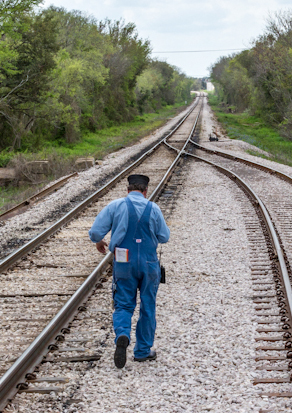
Management on the Pennsylvania Railroad was a group of screamers, while Penn Central's management was a group of incompetents. Conrail started slowly and overtime became a good railroad to work for, until the arrival of CSX. I enjoyed my job working on the railroad, but the last eight years were not happy ones. Company officials were always hiding in the weeds and writing employees up for some of the dumbest infractions. Today's management uses cameras and drones. Safety was the biggest joke on the railroad and always was from the day I hired out to the day I retired. It was push, push, push to make management look good, so they could receive a bonus. If some minor infraction happened or an employee was hurt, then the Rule Book came into play. If a trainmaster was caught breaking the rules and reported in many cases nothing happened. When you did a good job don't expect a pat on the back. Railroading is the only job, once hired, they try to fire you. Most of the employees I worked with only wanted to do their jobs and go home. Yes, there were some that had a hard on for the company, but management knew who these employees were. They would punish them by giving them overtime. I received ninety days on the street for supposedly stealing time. The problem was I had nothing to do with the timeslip. I held the brakeman's position and only had to write my employee number and name. The conductor handled the timeslip and the on and off duty times, but they wanted the conductor, so I was also punished. I took the ninety days as I knew I wasn't guilty and didn't fight them in their Kangaroo Court. I was paid for my time off. Upon my return I ran into one of my trainmasters and told him my wife said to give me ninety days every year as this the most relaxed he has been in the last twenty five years. Yes, the money was good and you could make six figures living on the job, but as you get older the money isn't quite as important as having time with your family. I missed many family functions, school plays, birthdays etc. Many of us have been married at least twice, some three times and one or two I knew four times. A railroader's wife becomes not only a mother, but in most cases a father. She is a Saint as she has the task of handling the everyday problems arising within a household and family. Working for a railroad is not a job, but a full time occupation even when not working. The railroad owns you, until the day you quit, file for disability or retire. Everything revolves around your job and the railroad including many of your friends. My feet and back are now paying the price for all the years worked. Walking on stones and manhandling drawbars have taken their toll. My advice to anyone reading this is to think twice before hiring out on a Class 1 railroad. It's not what you think.
Enjoy the hobby and have fun
 Train Order
Train Order